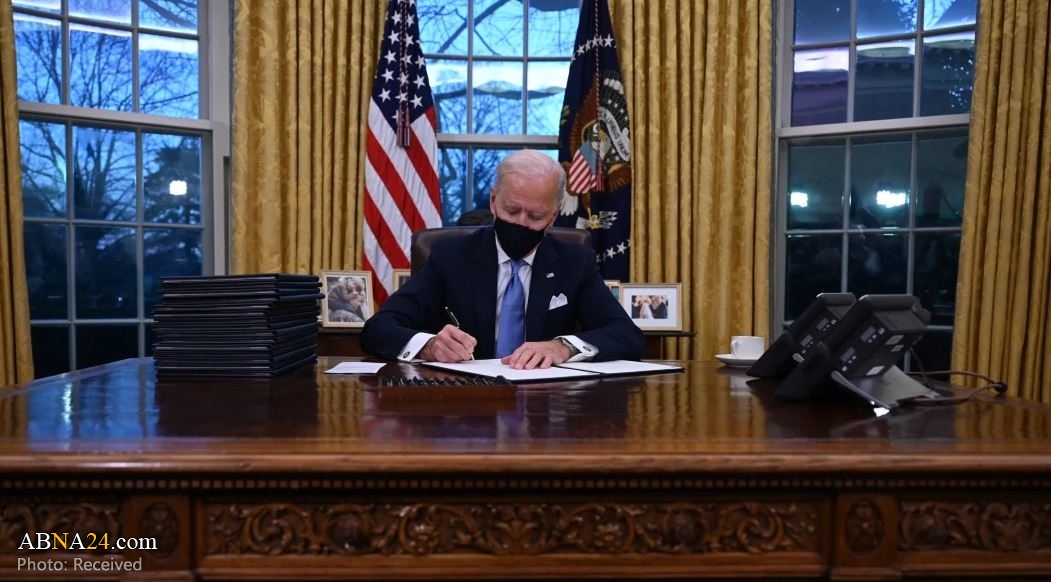AhlulBayt News Agency (ABNA): As Joe Biden prepares to assume office at the White House, signals coming out of his administration’s West Asia policymakers render Saudi Arabia is concerned about bilateral ties and also Yemen's case.
Biden’s candidate for national security advisor post Jake Sullivan retweeted Senator Todd Young’s discontentment with the US blacklisting of the Yemeni Ansarullah movement as a terrorist group last week and wrote: “Agree with @SenToddYoung on the last-minute terrorist designation of Houthi Movement. Houthi commanders need to be held accountable, but designating the whole organization will only inflict more suffering on Yemeni people and impede diplomacy critical to end the war.”
On January 11, Senator Todd Young, of Indiana, tweeted: “Today’s decision by @SecPompeo to declare the Houthi movement in Yemen as a terrorist organization is yet another misstep in the United States’ years long misguided approach to the conflict in Yemen.”
This is coming while on Saturday, 34 congressmen led by the Chairman of the House Committee on Foreign Affairs Georgy W. Meeks, in a letter to the Secretary of State Mike Pompeo said warned about the catastrophic consequences of the move and called it a “rushed” step.
“This move in the last days of the Trump administration will undoubtedly make what the UN says is the world’s largest humanitarian crisis much worse and push thousands of Yemenis towards greater peril. The fact that the Trump administration rushed this decision ahead without regard to consequences to Yemeni civilians or providing necessary waivers for life-saving aid is morally reprehensible. It also makes UN Special Envoy Martin Griffith’s already difficult job as peace negotiator that much harder and impedes the only viable pathway to ending this brutal war.”
Saudi disturbed dream
Saudi Arabia’s hasty welcome of the anti-Ansarullah move and its readiness to pay its expenses firstly proved that Riyadh after six years of fierce bombardment have not made any achievement in the Yemen war and thus seeks to shut the doors of negotiations and diplomacy both with Sana’a and among the Yemenis themselves. Secondly, thinking that the designation of Ansarullah as a terrorist organization would help weaken the resistant movement, the Saudis observe this measure by Trump as the last chance to obtain the minimum goals they sought in the anti-Yemeni campaign.
Still, growing denunciation of the move by the Congress and also incoming administration officials carries a message to the Saudis: The last hope of making achievements in the war against Yemen is a disturbed dream and that they cannot fish in the muddy water caused by Ansarullah designation.
Biden under pressure to end Yemen crisis
Meanwhile, the pro-peace approach of the Democrats in Yemen cannot be a source of optimism because the Saudi-led Arab coalition was formed when Barack Obama was president of the US. Obama gave go-ahead to the aggression by offering political and military support on the ground. But now Biden finds himself in front of no way but to end the war.
First, Biden who was under home and world public pressure to end the Saudi massacring of the Yemenis in his campaign speeches made two promises: To end the Trump travel ban and also to end the American support to the Saudi war on Yemen that has so far killed thousands, injured hundreds of thousands, and displaced millions of Yemeni people.
From another aspect, Biden who thinks of restoring the US credit in the international organizations feels a need to comply with the world community as the United Nations and also Washington’s European allies oppose Trump's decision.
Washington knows that there should not be waste of time because prolonged war means a complicated settlement process. As a result, the war economy will replace the national economy and creates an attraction for those seeking longer war. From a home Yemeni point of view, the separatist struggles, lack of adequate will by the resigned and fugitive President Abdrabbuh Mansour Hadi to talk to Ansarullah-controlled Sana’a, and the Saudi efforts to block the formation of dialogue process are the challenges of a political process in Yemen. In 2013, National Dialogue Conference was held under the supervision of the UN. No matter how comprehensive it was, it had a major flaw: It failed to unite the main power actors in Yemen to negotiate and make an agreement.
From a regional viewpoint, the location of Yemen along the Arabian and the Red Sea coasts tempts Saudi Arabia and the UAE to pursue their colonialist economic and geopolitical interests in Yemen. The Horn of Africa provides a favorable route for the Saudis to send their oil to the Arabian Sea and circumvent the Strait of Hormuz if the needed. Also, access to Aden port and also Socotra islands in the mouth of the Red Sea and also growing concentration of the Emirates to the Horn of Africa country especially Eritrea and Djibouti made Abu Dhabi since a long time waiting for an appropriate opportunity to involve in Yemen developments. So, getting the Arab coalition’s cooperation for an end to the crisis would be extremely difficult.
Even a fear of future Ansarullah power, either realistic or overstated, which is now an excuse to continue the war and direct intervention in Yemen developments can be addressed and removed by Iran’s proposal for regional dialogue and a non-aggression treaty between Saudi Arabia and Yemen on condition that Riyadh quits intervention, aggression, fueling sectarian fights, export terrorism, occupy oil-rich areas, and hostility to Yemenis— a condition largely unlikely, at least currently, with regard to the Saudi welcoming of Ansarullah designation as a foreign terrorist organization.
/129

